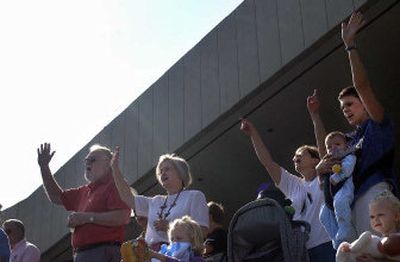Churches reconcile, but don’t reunite

The day Frank Hamilton’s church divided, three-fourths of the congregation walked out. They took all of church’s elders and its pastor with them, leaving only the building and a leaderless minority behind.
It was one of the worst evangelical splits Spokane had ever seen. Fourth Memorial Church regularly packed 1,200 members into its cavernous building at 2000 N. Standard St., but after a bitter fight in 1992 over how much power the elders should have over the church and how certain passages of the Bible should be interpreted, only 300 people, including Hamilton, remained.
“I remember we had a visiting pastor that first Sunday, Bob Smith from Community Bible Church,” said Hamilton, a Fourth Memorial church member. “He was a fire chief, and he came in with his fire gear on. He said, ‘You had a fire here.’ “
A fire, the small congregation nodded in agreement with Smith. And it would take the church 13 years to rebuild. The defectors, who temporarily relocated to Lewis and Clark High School, were also spiritually burned. Burning bridges and self-righteousness are not what the Bible refers to when it talks about loving thy neighbor and living the example of Jesus Christ, but that’s what the two congregations had done to each other.
On Sunday, Hamilton watched as Fourth Memorial and its departed congregation, Faith Bible Church, did an about-face. Members of the two churches gathered around the floating stage of the Spokane Opera House for a public reconciliation. Their pastors, John Repsold of Fourth Memorial and Dan Jarms of Faith Bible issued a co-sermon of unity and the importance of living an example of Jesus Christ’s message of loving one another.
“The outside world just looks at the church as a bunch of people who follow Jesus Christ,” Repsold said. “And they want to know – are we getting the job done? Thirteen years ago this month, we failed to get the job done.”
Jarms encouraged the two congregations to consider each other to be part of a greater church, a single church united under Jesus Christ and not groups of different people who meet in different places or different denominations defining their relationships according to their differences. The two congregations will remain separate, but they promised to find ways to work with each other toward spreading Christianity.
“Two years ago, John Repsold and Jay Letey said, ‘Let’s put this together. It will take some honest soul searching. We’re going to start praying for our churches, to humble our hearts and show us our own sins and pray for the other church, pray for their success,’ ” Jarms said. “The third step was to grant forgiveness.”
Christians outside the two churches, interviewed in the days leading up to the service, said the reconciliation is remarkable. Jerry Wall, who works for an international ministry in Billings focusing on Bible-based conflict resolution, said church splits are common, hurtful, and avoidable. Peacemaker Ministries, the group for which Wall works, encourages Christians to work through conflict.
Christians in conflict need to take responsibility for their contributions to the problem, confess and seek atonement, Wall said. Instead of walking away from a relationship, Peacemaker Ministries encourages people to talk personally about serious offenses and to shrug off the small stuff.
The elders and pastors of Fourth Memorial and Faith Bible spent more than a year both looking at their own churches’ roles in the breakup and seeking ways to atone. Last November, the congregations convened for joint communion, a baby step forward.
Lastly, forgiveness and unity are key tenets of Jesus Christ’s word, Wall said, and Christians who walk away from unresolved conflict aren’t allowing God’s work to be completed.
“The enemy of the soul lives to come in and foster and continually stir up feelings of hurt, pain and animosity,” said John Tusant, of the Greater Association of Evangelicals. “We could let this happen, but we would miss the blessing.”
Like Pastor Jarms preached Sunday, James Burford, a Disciples of Christ clergyman, said it’s important that different Christian churches and denominations embrace their similarities rather than their differences. Burford has spent several years as an interim minister to different Presbyterian congregations in order to promote oneness among Christians.
“It certainly broadens my perspective and understanding of how other people do church,” Burford said. “And, it does the same for the congregation. It helps people understand that whatever they’re used to isn’t the only way it can be done.”